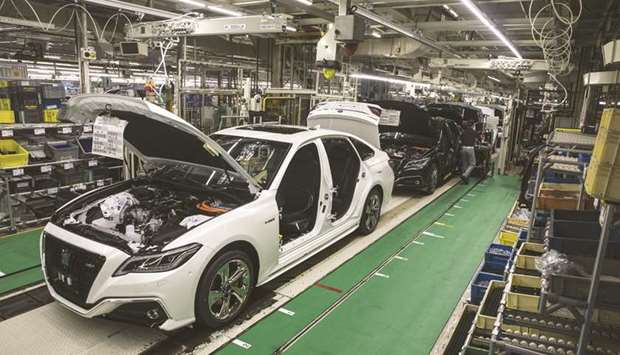Toyota in growth mode defies slowdown in global vehicle demand
Toyota isn't
letting a global slowdown get in the way of its plans to grow, reporting a
higher-than-expected quarterly profit on Thursday and raising its full-year
forecast.
 Japanese auto parts manufacturer
Denso Corp. last month slashed its profit outlook, and both it and fellow
Toyota group components maker Aisin Seiki Co. missed analysts' forecasts for quarterly
earnings. Toyota owns 35% of Denso and 39% of Aisin.
Japanese auto parts manufacturer
Denso Corp. last month slashed its profit outlook, and both it and fellow
Toyota group components maker Aisin Seiki Co. missed analysts' forecasts for quarterly
earnings. Toyota owns 35% of Denso and 39% of Aisin.
Even as a production shutdown in
China, the world's largest car market, has cast a pall over global automakers
already struggling to cope with a downshift in demand and rising costs on
next-generation technology, Toyota is betting it can sell more cars.
"The global market in 2020
will be probably lower than what was the market in 2019, but you saw our
forecast in terms of sales volume for 2020 and we plan to sell more cars than
in 2019 -- even if the market is declining," Didier Leroy, a Toyota
executive vice president, said at a press conference in Tokyo.
Toyota is targeting operating
profit of 2.5 trillion yen ($22.7 billion) for the full fiscal year through
March, up from a previous projection for 2.4 trillion yen and broadly in line
with analysts' expectations.
That contrasts with U.S. rivals
General Motors Co. and Ford Motor Co., both of which lost money in the last
quarter of 2019. GM expects earnings to be flat this calendar year while Ford
forecast a larger-than-expected drop in profits.
Shares of Toyota rose 2.6% in
Tokyo, the biggest jump since July. The stock is just shy of its four-year
high.
Toyota's bullish outlook reflects
less severe yen appreciation than it had feared, higher profit margins in North
America and Europe, and relentless cost cutting -- much of which has been borne
by the company's tight network of suppliers.
 Japanese auto parts manufacturer
Denso Corp. last month slashed its profit outlook, and both it and fellow
Toyota group components maker Aisin Seiki Co. missed analysts' forecasts for quarterly
earnings. Toyota owns 35% of Denso and 39% of Aisin.
Japanese auto parts manufacturer
Denso Corp. last month slashed its profit outlook, and both it and fellow
Toyota group components maker Aisin Seiki Co. missed analysts' forecasts for quarterly
earnings. Toyota owns 35% of Denso and 39% of Aisin.
"It's a very severe
situation for our suppliers," Masayoshi Shirayanagi, Toyota's operating
officer in charge of purchasing, told reporters in Tokyo. He said the automaker
is working to strengthen those ties by taking suggestions for loosening tight
specifications and easing exacting standards where possible.
"Last year, we met with the
heads of companies in our supplier associations in a group discussion and they
expressed some unhappiness with Toyota," Shirayanagi said.
Operating income in the fiscal
third quarter, which ended in December, was 654 billion yen, topping the
average analyst forecast of 643.8 billion yen. Revenue came to 7.54 trillion
yen, compared with the consensus estimate for 7.42 trillion yen.
Despite softening sales volumes
in Japan, North America and China, Toyota benefited from steady growth in
Europe, where hybrid gas-electric vehicles accounted for 52% of its sales last
year. Profit margin in the region climbed in the latest quarter to 4.6% from
3.2% a year ago.
"Hybrid vehicles are chosen
by more than half of our customers and this has boosted our overall sales in
Europe," Leroy said.
That has given a boost to the
company's mainstream Toyota brand -- sales of which last year exceeded 1
million vehicles for the first time since 2008 -- and helped its Lexus luxury
brand post a double-digit sales growth.
In North America, operating
profit rose to 105.9 billion yen, nearly four times the 26.4 billion in the
year-earlier period. That came despite a 2% slide in sales volume to 668,000.
Company officials attributed that
profit surge to a number of factors, including a shift in production toward
more light trucks such as sport utility vehicles and pickups. The company has
been reworking its manufacturing footprint in the U.S. to crank out more SUVs
such as its best-selling RAV4 and popular mid-size Highlander and cope with
slow sales of sedans like its Camry model.
"The U.S. Highlander is
fresh while RAV4 is very strong," said Tatsuo Yoshida, senior auto analyst
at Bloomberg Intelligence. "Full-year guidance was revised up, but
fourth-quarter assumptions are conservative and it is likely Toyota eventually
beats its guidance."
Virus
Impact
Toyota expects its global sales
volume for the fiscal year to hit 8.95 million vehicles, unchanged from an
earlier projection. Including group companies, it sold 10.7 million vehicles
last calendar year, second only to Volkswagen AG's 10.9 million. GM sold 8.4
million vehicles last year and Ford shipped about 5.4 million.
One wild card is the impact from
the production shutdown in China due to the spread of a deadly virus. Toyota
said late last month it would extend a planned work stoppage at its Chinese
factories until at least Feb. 9.
Japan's largest automaker said
its profit forecast doesn't take the shutdown into account and that it is still
assessing the likely impact on its earnings and global supply chain from a
protracted work stoppage.
"The impact of this new
additional problem is really unclear at this stage," Toyota's Leroy said.
Toyota said sales in its home
market were hit hard by an October sales tax hike, with income and sales
declining in the latest quarter. But Japan is still its most lucrative market,
where it earned more than 400 billion yen in profit and boasted margins topping
10%.
Credit: The Nation
Thailand




Comments
Post a Comment